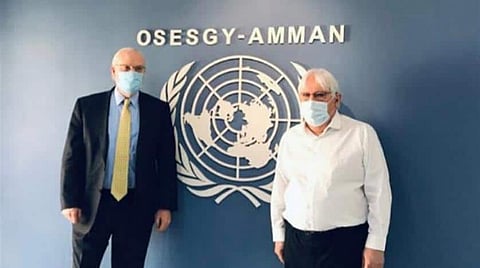

The United States' envoy to Yemen, Tim Lenderking; and United Nations envoy, Martin Griffiths, are to meet in Riyadh on Saturday for talks on the Yemeni crisis.
They are set to meet with Saudi and Yemeni government officials to discuss the Kingdom's new initiative aimed at resolving the conflict.
Informed sources confirmed that the envoys will be in Riyadh on Saturday, reflecting efforts to reach a political settlement.
In remarks to Asharq Al-Awsat on Thursday, Saudi Ambassador to Yemen Mohammed Al-Jaber said that Griffiths will be setting the mechanism to implement the initiative.
The State Department announced Lenderking's trip to the region on Thursday. The Iran-backed Houthi militias met the declaration and political efforts to resolve the crisis by firing eight armed drones towards Saudi cities later that day. A drone struck a petroleum products station in Jizan, causing minor damage.
This will be Lenderking's third tour of the Gulf since his appointment in February. At the end of his second tour; which lasted 17 days, he announced that he would return to the region if the Houthis were ready to talk
Reuters had reported on a meeting that had taken place between the envoy and a Houthi delegation in Muscat on February 26. The State Department did not deny that the meeting had taken place.
Lenderking stated during an Atlantic Council seminar that he had exchanged messages with the Houthis. He also proposed a ceasefire aimed at reaching a peaceful solution to the crisis.
Nonresident fellow at the Center for Middle East Policy at the Brookings Institution, Gregory Johnsen said none of these various armed groups in Yemen; whether the government forces, Houthis or Southern Transitional Council – are strong enough to impose their will on the rest of the country.
In an article to the Brookings Institution, he also added: "Yet nearly all of these groups possess enough men and munitions to act as a spoiler to any national peace deal they feel does not adequately address their interests."
"More concerning still is the fact that the longer the fighting continues, the more armed groups are likely to emerge. (…) Combine that with the fact that Yemen has a shrinking economic pie; exports are largely limited to the oil and gas fields in Marib, Shabwa and Hadramawt — and the recipe is in place for years of conflict to come," he also continued.
Moreover, he said the Houthis "do not want to be part of a state; they want to be the state. They are not about to give up at the bargaining table what they believe they have won on the battlefield."
"Yemen's fragmentation raises a number of challenges for the United States. The US isn't going to recognize all of the different warlords; and armed groups that hold sway on the ground in Yemen. But for a variety of reasons; from counterterrorism to humanitarian and refugee concerns to Red Sea shipping lanes; the US is going to have to deal with many of them."
"The nation-state system is the key building block of diplomacy, international relations and national security. The United States, like most countries, is set up to deal with other nation-states. The military prefers to work 'by, with, and through' local partners," Johnsen also said.
